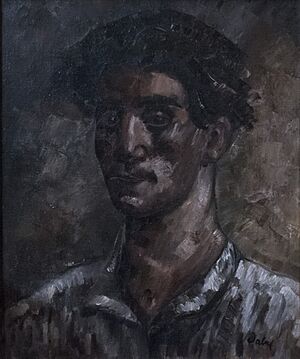Eugène Dabit facts for kids
Eugène Dabit (born September 21, 1898, in Mers-les-Bains, France – died August 21, 1936, in Sevastopol, Soviet Union) was a French writer with socialist ideas. He was known for writing about the lives of ordinary people.
Dabit was part of a group of writers who focused on "proletarian literature". This means they wrote stories about the lives and experiences of working-class people. He became very famous for his novel L'Hôtel du Nord, which won an important award called the Prix du roman populiste. This book was so popular that it was even made into a movie in 1938.
Eugène Dabit was also a talented artist. He studied art at a famous school called the École des Beaux-Arts with a teacher named Louis-François Biloul. He was a close friend and writing partner of another well-known French writer, André Gide. Dabit sadly passed away from an illness while traveling with Gide in the Soviet Union in 1936. He also exchanged many letters with the writer Roger Martin du Gard.
Who Was Eugène Dabit?
Eugène Dabit grew up in France and developed a strong interest in writing about everyday life. His work often showed the challenges and hopes of people who worked hard for a living. He believed that literature should reflect the real world and the experiences of everyone, not just the wealthy or famous.
His most famous book, L'Hôtel du Nord, tells the story of people living in a hotel in Paris. It explores their dreams, struggles, and relationships. The book's success helped make "proletarian literature" more popular and showed that stories about ordinary lives could be very powerful and interesting.
Dabit's Books and Stories
Eugène Dabit wrote many books and stories during his life. His works often explored themes of city life, the countryside, and the feelings of people trying to find their place in the world. Here are some of his notable works:
- Petit Louis (1930)
- L'Hôtel du Nord (1929)
- Yvonne (1929 - published in 2009)
- La zone verte (1935, re-published in 2009)
- Les maîtres de la peinture espagnole (1937)
- Au Pont Tournant
- Le mal de vivre (with Étrangères) (1937)
- Train de vies
- Faubourgs de Paris
- Un mort tout neuf
- L’île (Gallimard, 1934)
- Villa Oasis ou Les faux bourgeois (1932)
- Ville lumière
- Journal intime (1926-1938)
See also
 In Spanish: Eugène Dabit para niños
In Spanish: Eugène Dabit para niños


